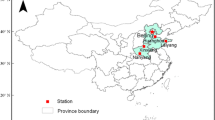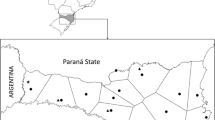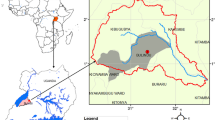Abstract
The potential impacts of climate warming on grain yield, water, and nitrogen consumptions of maize have been repeatedly assessed across different regions of the world. However, to date, there is no comprehensive, large-scale evaluation on the effects of climate warming on the cropping systems of Iran. The objective of the current study was to quantify the effects of climate warming on the length of the growing period and grain yield of maize. We also tested the potential of changes in irrigation, nitrogen application rate, and using late maturity cultivars of maize to offset the negative impact of climate warming in order to maintain the current levels of grain yield (4 to 10 t ha−1 depending upon the province) in Iran. The crop modeling framework SIMPLACE was used to evaluate the effects of the warming temperatures, nitrogen application rate, and changes in thermal requirements of the cultivar scenario combinations on grain yield of maize in Iran. The climate, soil, and management inputs of the crop model were obtained from global datasets as grid cells at 0.5° × 0.5° resolution, and the outputs of the crop model were aggregated to the province level. Results of the grain yield projections showed a decline (− 0.1 to − 22%) in maize, especially in the Southern provinces (Khuzestan, Fars, and Kerman) under different warming scenarios by + 0.5 to + 2 °C, an increase from the baseline. The grain yield decline appeared to be mainly driven by a shortening of the length of the growing season and extreme heat stress during anthesis, the most sensitive period of crop growth. Increasing temperatures during the growing season lead to a marginal increase of absolute irrigation requirements over the maize growing areas. For all provinces, application of 10–25% more nitrogen than the current rate (170 kg N/ha-1) was able to offset the negative effects of higher temperatures (+ 0.5 and + 1.0 °C) during the growing season. However, the increased nitrogen application rates were not able to maintain the baseline level of grain yield under the + 1.5 and + 2.0 °C warming scenarios. Introducing late maturity cultivars, which required 20% more temperature sum than current cultivars to reach maturity, improved the grain yield in the cooler provinces by up to 10%. In conclusion, the grain yield baseline level may not be maintained under the highest magnitude of warming by increasing nitrogen application rates or using late maturity cultivars. Furthermore, more water is needed to produce a unit of grain under a warming climate. This study also suggests that combined adaptation strategies should be considered by policymakers in order to mitigate the negative impact of climate warming on the cropping systems of Iran.








Similar content being viewed by others
References
Abbaspour KC, Faramarzi M, Ghasemi SS, Yang H (2009) Assessing the impact of climate change on water resources in Iran. Water Resour Res 45:1–16. https://doi.org/10.1029/2008WR007615
Asseng S, Foster I, Turner NC (2011) The impact of temperature variability on wheat yields. Glob Chang Biol 17:997–1012. https://doi.org/10.1111/j.1365-2486.2010.02262.x
Badeck F-W, Bondeau A, Bottcher K, Doktor D, Lucht W, Schaber J, Sitch S (2004) Responses of spring phenology to climate change. New Phytol 162:295–309. https://doi.org/10.1111/j.1469-8137.2004.01059.x
Bannayan M, Eyshi Rezaei E (2014) Future production of rainfed wheat in Iran (Khorasan province): climate change scenario analysis. Mitig Adapt Strateg Glob Chang 19:211–227. https://doi.org/10.1007/s11027-012-9435-x
Batjes NH (1995) A homogenized soil data file for global environmental research: a subset of FAO, ISRIC, and NRCS profiles (version 1.0). Work Pap Prepring 95/10b, Int Soil Ref Inf Center, Wageningen
Batjes NH (1997) A world dataset of derived soil properties by FAO-UNESCO soil unit for global modelling. Soil Use Manag 13:9–16. https://doi.org/10.1111/j.1475-2743.1997.tb00550.x
Brisson N, Ruget F, Gate P et al (2002) STICS: a generic model for simulating crops and their water and nitrogen balances. II. Model validation for wheat and maize. Agronomie 22:69–92. https://doi.org/10.1051/Agro:2001005
Challinor AJ, Watson J, Lobell DB, Howden SM, Smith DR, Chhetri N (2014) A meta-analysis of crop yield under climate change and adaptation. Nat Clim Chang 4:287–291. https://doi.org/10.1038/nclimate2153
Choudhury ATMA, Kennedy IR (2005) Nitrogen fertilizer losses from rice soils and control of environmental pollution problems. Commun Soil Sci Plant Anal 36:1625–1639. https://doi.org/10.1081/CSS-200059104
Crawford AJ, McLachlan DH, Hetherington AM, Franklin KA (2012) High temperature exposure increases plant cooling capacity. Curr Biol 22:396–397. https://doi.org/10.1016/j.cub.2012.03.044
Dinpashoh Y, Jhajharia D, Fakheri-Fard A, Singh VP, Kahya E (2011) Trends in reference crop evapotranspiration over Iran. J Hydrol 399:422–433. https://doi.org/10.1016/j.jhydrol.2011.01.021
Ehleringer J, Björkman O (1977) Quantum yields for CO2 uptake in C3 and C4 plants: dependence on temperature, CO2, and O2 concentration. Plant Physiol 59:86–90. https://doi.org/10.1104/PP.59.1.86
Enders A, Diekkrüger B, Laudien R, Gaiser T, Bareth G (2010) The IMPETUS spatial decision support systems. In: Impacts of global change on the hydrological cycle in West and Northwest Africa. Springer Berlin Heidelberg, Berlin, Heidelberg, p 360–393
Evans JP (2009) 21st century climate change in the Middle East. Clim Chang 92:417–432. https://doi.org/10.1007/s10584-008-9438-5
Eyshi Rezaei E, Siebert S, Ewert F (2015a) Impact of data resolution on heat and drought stress simulated for winter wheat in Germany. Eur J Agron 65:69–82. https://doi.org/10.1016/j.eja.2015.02.003
Eyshi Rezaei E, Siebert S, Ewert F (2015b) Intensity of heat stress in winter wheat—phenology compensates for the adverse effect of global warming. Environ Res Lett 10:024012. https://doi.org/10.1088/1748-9326/10/2/024012
Eyshi Rezaei E, Siebert S, Ewert F (2017) Climate and management interaction cause diverse crop phenology trends. Agric For Meteorol 233:55–70. https://doi.org/10.1016/j.agrformet.2016.11.003
Eyshi Rezaei E, Siebert S, Hüging H, Ewert F (2018) Climate change effect on wheat phenology depends on cultivar change. Sci Rep 8:4891. https://doi.org/10.1038/s41598-018-23101-2
Eyshi Rezaei E, Webber H, Gaiser T, Naab J, Ewert F (2015c) Heat stress in cereals: mechanisms and modelling. Eur J Agron 64:98–113. https://doi.org/10.1016/j.eja.2014.10.003
Farooq M, Bramley H, Palta JA, Siddique KHM (2011) Heat stress in wheat during reproductive and grain-filling phases. CRC Crit Rev Plant Sci 30:491–507. https://doi.org/10.1080/07352689.2011.615687
Foltz RC (2002) Iran’s water crisis: cultural, political, and ethical dimensions. J Agric Environ Ethics 15:357–380. https://doi.org/10.1023/A:1021268621490
Gaiser T, Perkons U, Küpper PM, Kautz T, Uteau-Puschmann D, Ewert F, Enders A, Krauss G (2013) Modeling biopore effects on root growth and biomass production on soils with pronounced sub-soil clay accumulation. Ecol Model 256:6–15. https://doi.org/10.1016/j.ecolmodel.2013.02.016
Ghobadi R, Shirkhani A, Jalilian A (2015) Effects of water stress and nitrogen fertilizer on yield, its components, water and nitrogen use efficiency of corn (Zea mays L.) cv. SC. 704. Appl Field Crops Res 106:79–87
Giannakopoulos C, Le Sager P, Bindi M et al (2009) Climatic changes and associated impacts in the Mediterranean resulting from a 2 °C global warming. Glob Planet Chang 68:209–224. https://doi.org/10.1016/j.gloplacha.2009.06.001
Gray SB, Dermody O, Klein SP, Locke AM, McGrath JM, Paul RE, Rosenthal DM, Ruiz-Vera UM, Siebers MH, Strellner R, Ainsworth EA, Bernacchi CJ, Long SP, Ort DR, Leakey ADB (2016) Intensifying drought eliminates the expected benefits of elevated carbon dioxide for soybean. Nat Plants 2:16132. https://doi.org/10.1038/nplants.2016.132
Guo R, Lin Z, Mo X, Yang C (2010) Responses of crop yield and water use efficiency to climate change in the North China Plain. Agric Water Manag 97:1185–1194. https://doi.org/10.1016/j.agwat.2009.07.006
Hajarpoor A (2014) Simulating climate change impacts on production of chickpea under water-limited conditions. Agric Sci Dev 3:209–217
Hartmann DL, Tank AMGK, Rusticucci M (2013) IPCC fifth assessment report, climatie change 2013: the physical science basis
He L, Asseng S, Zhao G, Wu D, Yang X, Zhuang W, Jin N, Yu Q (2015) Impacts of recent climate warming, cultivar changes, and crop management on winter wheat phenology across the Loess Plateau of China. Agric For Meteorol 200:135–143. https://doi.org/10.1016/j.agrformet.2014.09.011
Hijmans RJ (2003) The effect of climate change on global potato production. Am J Potato Res 80:271–279. https://doi.org/10.1007/BF02855363
Hildén M, Lehtonen H, Bärlund I et al (2005) The practice and process of adaptation in Finnish agriculture. Work Pap 5:28
Howden SM, Soussana J-F, Tubiello FN, Chhetri N, Dunlop M, Meinke H (2007) Adapting agriculture to climate change. Proc Natl Acad Sci 104:19691–19696. https://doi.org/10.1073/pnas.0701890104
Iran’s Agricultural Ministry (2010) Annually statistics of agricultural production. http://www.maj.ir. Accessed 10 Apr 2012
Karbasioun M (2007) Towards a competency profile for the role of instruction of agricultural extension professionals in Esfahan. In: Wageningen Univ. Res. Cent. http://edepot.wur.nl/26909
Kousari MR, Ahani H, Hendi-zadeh R (2013) Temporal and spatial trend detection of maximum air temperature in Iran during 1960–2005. Glob Planet Chang 111:97–110. https://doi.org/10.1016/j.gloplacha.2013.08.011
Krzywinski M, Altman N (2014) Visualizing samples with box plots. Nat Methods 11:119–120. https://doi.org/10.1038/nmeth.2813
Lashkari A, Alizadeh A, Rezaei EE, Bannayan M (2012) Mitigation of climate change impacts on maize productivity in northeast of Iran: a simulation study. Mitig Adapt Strateg Glob Chang 17:1–16. https://doi.org/10.1007/s11027-011-9305-y
Leclère D, Jayet P-A, de Noblet-Ducoudré N (2013) Farm-level autonomous adaptation of European agricultural supply to climate change. Ecol Econ 87:1–14. https://doi.org/10.1016/j.ecolecon.2012.11.010
Liu B, Asseng S, Müller C, Ewert F, Elliott J, Lobell DB, Martre P, Ruane AC, Wallach D, Jones JW, Rosenzweig C, Aggarwal PK, Alderman PD, Anothai J, Basso B, Biernath C, Cammarano D, Challinor A, Deryng D, Sanctis GD, Doltra J, Fereres E, Folberth C, Garcia-Vila M, Gayler S, Hoogenboom G, Hunt LA, Izaurralde RC, Jabloun M, Jones CD, Kersebaum KC, Kimball BA, Koehler AK, Kumar SN, Nendel C, O’Leary GJ, Olesen JE, Ottman MJ, Palosuo T, Prasad PVV, Priesack E, Pugh TAM, Reynolds M, Rezaei EE, Rötter RP, Schmid E, Semenov MA, Shcherbak I, Stehfest E, Stöckle CO, Stratonovitch P, Streck T, Supit I, Tao F, Thorburn P, Waha K, Wall GW, Wang E, White JW, Wolf J, Zhao Z, Zhu Y (2016) Similar estimates of temperature impacts on global wheat yield by three independent methods. Nat Clim Chang 6:1130–1136. https://doi.org/10.1038/nclimate3115
Lobell DB, Bänziger M, Magorokosho C, Vivek B (2011a) Nonlinear heat effects on African maize as evidenced by historical yield trials. Nat Clim Chang 1:42–45. https://doi.org/10.1038/nclimate1043
Lobell DB, Burke MB, Tebaldi C, Mastrandrea MD, Falcon WP, Naylor RL (2008) Prioritizing climate change adaptation need for food security in 2030. Science 319:607–610. https://doi.org/10.1126/science.1152339
Lobell DB, Hammer GL, McLean G, Messina C, Roberts MJ, Schlenker W (2013) The critical role of extreme heat for maize production in the United States. Nat Clim Chang 3:497–501. https://doi.org/10.1038/nclimate1832
Lobell DB, Schlenker W, Costa-Roberts J (2011b) Climate trends and global crop production since 1980. Science 333:616–620
Luo Q, Bellotti W, Williams M, Wang E (2009) Adaptation to climate change of wheat growing in South Australia: analysis of management and breeding strategies. Agric Ecosyst Environ 129:261–267. https://doi.org/10.1016/j.agee.2008.09.010
Maddah V, Soltani A, Zeinali E, Bannayan-Aval M (2015) Simulating climate change impacts on wheat production in Gorgan, Iran. Bull Environ Pharmacol Life Sci 4:58–67
Menzel A, Sparks TH, Estrella N et al (2006) European phenological response to climate change matches the warming pattern. Glob Chang Biol 12:1969–1976. https://doi.org/10.1111/j.1365-2486.2006.01193.x
Moradi R, Koocheki A, Nassiri Mahallati M (2014) Adaptation of maize to climate change impacts in Iran. Mitig Adapt Strateg Glob Chang 19:1223–1238. https://doi.org/10.1007/s11027-013-9470-2
Moradi R, Koocheki A, Nassiri Mahallati M, Mansoori H (2013) Adaptation strategies for maize cultivation under climate change in Iran: irrigation and planting date management. Mitig Adapt Strateg Glob Chang 18:265–284. https://doi.org/10.1007/s11027-012-9410-6
Mueller ND, West PC, Gerber JS, MacDonald GK, Polasky S, Foley JA (2014) A tradeoff frontier for global nitrogen use and cereal production. Environ Res Lett 9. https://doi.org/10.1088/1748-9326/9/5/054002
Ortiz R, Sayre KD, Govaerts B, Gupta R, Subbarao GV, Ban T, Hodson D, Dixon JM, Iván Ortiz-Monasterio J, Reynolds M (2008) Climate change: can wheat beat the heat? Agric Ecosyst Environ 126:46–58. https://doi.org/10.1016/j.agee.2008.01.019
Parry M, Rosenzweig C, Iglesias A et al (2004) Effects of climate change on global food production under SRES emissions and socio-economic scenarios. Glob Environ Chang 14:53–67. https://doi.org/10.1016/j.gloenvcha.2003.10.008
Portmann FT, Siebert S, Döll P (2010) MIRCA2000—global monthly irrigated and rainfed crop areas around the year 2000: a new high-resolution data set for agricultural and hydrological modeling. Glob Biogeochem Cycles 24:1–24. https://doi.org/10.1029/2008GB003435
Ray DK, Gerber JS, MacDonald GK et al (2015) Climate variation explains a third of global crop yield variability. Nat Commun 6:5989. https://doi.org/10.1038/ncomms6989
Rienecker MM, Suarez MJ, Gelaro R, Todling R, Bacmeister J, Liu E, Bosilovich MG, Schubert SD, Takacs L, Kim GK, Bloom S, Chen J, Collins D, Conaty A, da Silva A, Gu W, Joiner J, Koster RD, Lucchesi R, Molod A, Owens T, Pawson S, Pegion P, Redder CR, Reichle R, Robertson FR, Ruddick AG, Sienkiewicz M, Woollen J (2011) MERRA: NASA’s modern-era retrospective analysis for research and applications. J Clim 24:3624–3648. https://doi.org/10.1175/JCLI-D-11-00015.1
Rosenzweig C, Karoly D, Vicarelli M, Neofotis P, Wu Q, Casassa G, Menzel A, Root TL, Estrella N, Seguin B, Tryjanowski P, Liu C, Rawlins S, Imeson A (2008) Attributing physical and biological impacts to anthropogenic climate change. Nature 453:353–357. https://doi.org/10.1038/nature06937
Ruane AC, Goldberg R, Chryssanthacopoulos J (2015) Climate forcing datasets for agricultural modeling: merged products for gap-filling and historical climate series estimation. Agric For Meteorol 200:233–248. https://doi.org/10.1016/j.agrformet.2014.09.016
Saboohi R, Soltani S, Khodagholi M (2012) Trend analysis of temperature parameters in Iran. Theor Appl Climatol 109:529–547. https://doi.org/10.1007/s00704-012-0590-5
Sakurai G, Iizumi T, Yokozawa M (2011) Varying temporal and spatial effects of climate on maize and soybean affect yield prediction. Clim Res 49:143–154. https://doi.org/10.3354/cr01027
Sánchez B, Rasmussen A, Porter JR (2014) Temperatures and the growth and development of maize and rice: a review. Glob Chang Biol 20:408–417. https://doi.org/10.1111/gcb.12389
Sayari N, Bannayan M, Alizadeh A, Farid A, Hessami Kermani MR, Eyshi Rezaei E (2015) Climate change impact on legumes’ water production function in the northeast of Iran. J Water Clim Chang 6:374–385. https://doi.org/10.2166/wcc.2014.139
Schlenker W, Lobell DB (2010) Robust negative impacts of climate change on African agriculture. Environ Res Lett 5:1–8. https://doi.org/10.1088/1748-9326/5/1/014010
Siebert S, Ewert F (2012) Spatio-temporal patterns of phenological development in Germany in relation to temperature and day length. Agric For Meteorol 152:44–57. https://doi.org/10.1016/j.agrformet.2011.08.007
Soltani A, Sinclair TR (2012) Dry matter distribution and yield formation. In: Modeling physiology of crop development, growth and yield. CABI, Wallingford, pp 129–139
Tabari H, Hosseinzadeh Talaee P (2011) Recent trends of mean maximum and minimum air temperatures in the western half of Iran. Meteorog Atmos Phys 111:121–131. https://doi.org/10.1007/s00703-011-0125-0
Tabari H, Somee BS, Zadeh MR (2011) Testing for long-term trends in climatic variables in Iran. Atmos Res 100:132–140. https://doi.org/10.1016/j.atmosres.2011.01.005
Tao F, Yokozawa M, Liu J, Zhang Z (2008) Climate-crop yield relationships at provincial scales in China and the impacts of recent climate trends. Clim Res 38:83–94. https://doi.org/10.3354/cr00771
Tao F, Yokozawa M, Xu Y, Hayashi Y, Zhang Z (2006) Climate changes and trends in phenology and yields of field crops in China, 1981–2000. Agric For Meteorol 138:82–92. https://doi.org/10.1016/j.agrformet.2006.03.014
Tao F, Zhang Z, Xiao D, Zhang S, Rötter RP, Shi W, Liu Y, Wang M, Liu F, Zhang H (2014) Responses of wheat growth and yield to climate change in different climate zones of China, 1981–2009. Agric For Meteorol 189:91–104. https://doi.org/10.1016/j.agrformet.2014.01.013
Tao F, Zhang Z, Zhang S, Rötter RP, Shi W, Xiao D, Liu Y, Wang M, Liu F, Zhang H (2016) Historical data provide new insights into response and adaptation of maize production systems to climate change/variability in China. F Crop Res 185:1–11. https://doi.org/10.1016/j.fcr.2015.10.013
Teixeira EI, Fischer G, van Velthuizen H, Walter C, Ewert F (2013) Global hot-spots of heat stress on agricultural crops due to climate change. Agric For Meteorol 170:206–215. https://doi.org/10.1016/j.agrformet.2011.09.002
Thompson DWJ, Kennedy JJ, Wallace JM, Jones PD (2008) A large discontinuity in the mid-twentieth century in observed global-mean surface temperature. Nature 453:646–649. https://doi.org/10.1038/nature06982
Trnka M, Rötter RP, Ruiz-Ramos M, Kersebaum KC, Olesen JE, Žalud Z, Semenov MA (2014) Adverse weather conditions for European wheat production will become more frequent with climate change. Nat Clim Chang 4:637–643. https://doi.org/10.1038/nclimate2242
Trudgill DL, Honek A, Li D, Van Straalen NM (2005) Thermal time—concepts and utility. Ann Appl Biol 146:1–14
Urwin K, Jordan A (2008) Does public policy support or undermine climate change adaptation? Exploring policy interplay across different scales of governance. Glob Environ Chang 18:180–191. https://doi.org/10.1016/j.gloenvcha.2007.08.002
Valizadeh J, Ziaei SM, Mazloumzadeh SM (2014) Assessing climate change impacts on wheat production (a case study). J Saudi Soc Agric Sci 13:107–115. https://doi.org/10.1016/j.jssas.2013.02.002
Webber H, Zhao G, Wolf J, Britz W, Vries W, Gaiser T, Hoffmann H, Ewert F (2015) Climate change impacts on European crop yields: do we need to consider nitrogen limitation? Eur J Agron 71:123–134. https://doi.org/10.1016/j.eja.2015.09.002
Wheeler TR, Hong TD, Ellis RH, Batts GR, Morison JIL, Hadley P (1996) The duration and rate of grain growth, and harvest index, of wheat (Triticum aestivum L.) in response to temperature and CO2. J Exp Bot 47:623–630. https://doi.org/10.1093/jxb/47.5.623
Wolf J (2012) User guide for LINTUL5: simple generic model for simulation of crop growth under potential, water limited and nitrogen, phosphorus and potassium limited conditions
Wu Z, Huang NE, Wallace JM, Smoliak BV, Chen X (2011) On the time-varying trend in global-mean surface temperature. Clim Dyn 37:759–773. https://doi.org/10.1007/s00382-011-1128-8
Zhao G, Webber H, Hoffmann H, Wolf J, Siebert S, Ewert F (2015) The implication of irrigation in climate change impact assessment: a European-wide study. Glob Chang Biol 21:4031–4048. https://doi.org/10.1111/gcb.13008
Zhu ZL, Chen DL (2002) Nitrogen fertilizer use in China—contributions to food production, impacts on the environment and best management strategies. Nutr Cycl Agroecosyst 63:117–127. https://doi.org/10.1023/A:1021107026067
Funding
Research support was provided by the German Federal Ministry of Education and Research (Project: GlobeDrought, grant no. 02WGR1457F).
Author information
Authors and Affiliations
Corresponding author
Rights and permissions
About this article
Cite this article
Rezaei, E.E., Lashkari, A. The consequences of change in management practices on maize yield under climate warming in Iran. Theor Appl Climatol 137, 1001–1013 (2019). https://doi.org/10.1007/s00704-018-2637-8
Received:
Accepted:
Published:
Issue Date:
DOI: https://doi.org/10.1007/s00704-018-2637-8




